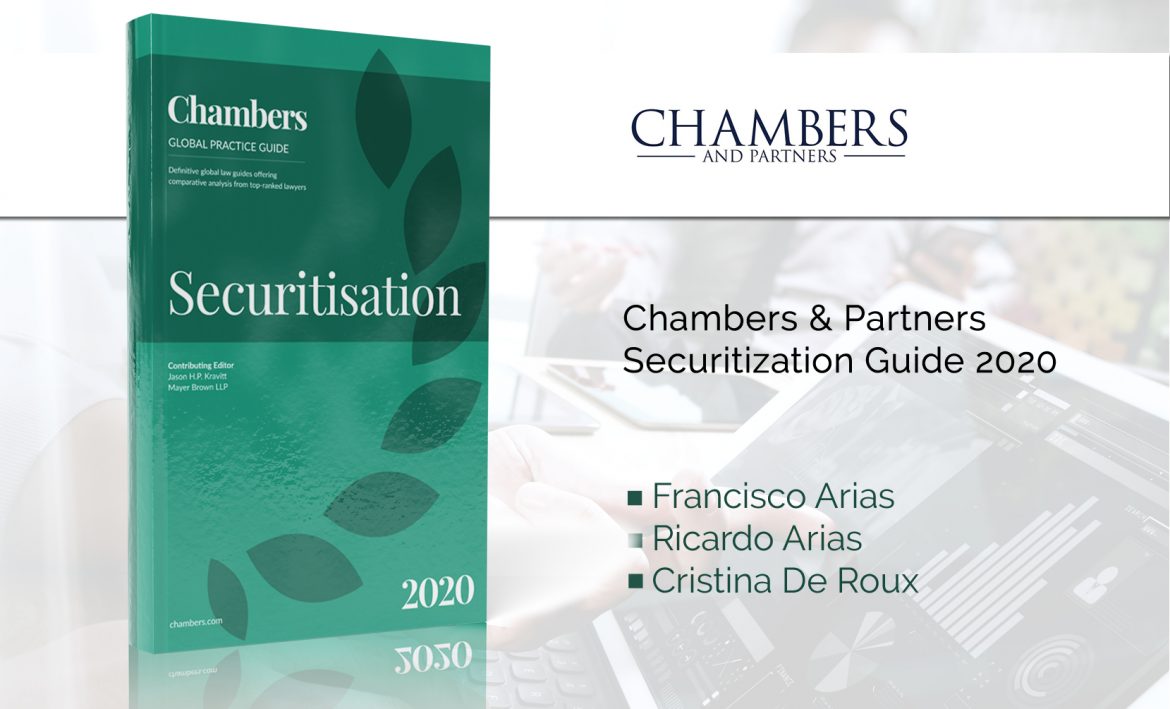Superintendencia de Sujetos No Financieros emite nueva reglamentación para abogados y contadores públicos autorizados
Panamá, 24 de julio de 2020. Mediante el Acuerdo JD-01-2020, publicado en Gaceta Oficial No. 29076 del 24 de julio de 2020, la Superintendencia de Sujetos No Financieros (SSNF) ha establecido un conjunto de nuevos lineamientos y directrices a los abogados y contadores públicos autorizados, cuando en el ejercicio de su actividad profesional realicen algunas
- Publicado en 2020, Press Room, Publicaciones
Guía de Mercado de Valores de Chambers & Partners 2020
Panamá, 9 de marzo de 2019. Los socios Francisco Arias, Ricardo Arias, y la asociada Cristina De Roux, contribuyeron con su experiencia profesional sobre la actividad del mercado de valores en Panamá. La versión en línea del capítulo de Panamá está disponible aquí. O puede descargar la opción PDF aquí.
A look at the compliance measures applicable to the Stock Market
Pablo Epifanio, Senior Associate, Morgan & Morgan The stock market is undoubtedly one of the most important economic forces in the world. Every year, billions of dollars are moved through stock exchange operations, and year after year, in most jurisdictions, the stock market is promoted as a tool for financing or capturing capital for issuers
- Publicado en Press Room, startups_resources
La Ley de Procesos Concursales de Insolvencia en Panamá
Analissa Carles, Abogada Asociada, Morgan & Morgan Desde el 19 de mayo de 2016, la figura de “Quiebra” dejó de existir en Panamá para darle paso a unos procesos innovadores en nuestro ordenamiento jurídico, conocidos por la ahora vigente Ley 12 de 2016, como Procesos Concursales de Insolvencia. Estos son la Reorganización y la Liquidación.
Nueva Ley de amnistía tributaria en Panamá: sociedades anónimas y fundaciones de interés de privado
Alvaro Tomas, socio y vicepresidente de Operaciones de la Unidad de Servicios Fiduciarios de Morgan & Morgan El gobierno panameño emitió la Ley 99 de 11 de octubre de 2019 que establece una ley de Amnistía Tributaria General (“Amnistía”) que incluye la eliminación, por un periodo limitado y en forma escalonada, de multas y
Consideraciones previas al inicio de un negocio
María Eugenia Brenes, asociada del Departamento de Propiedad Intelectual y Corporativo de Morgan & Morgan [email protected] Formalizar un negocio requiere varias decisiones de índole legal. Titular del Negocio Lo primero que uno debe considerar es si desea emprenderlo a título personal, o a través de una sociedad anónima. Esta decisión es muy importante y ella
- Publicado en 2019, Press Room, startups_resources_esp
What employers need to know about labor regulations in the Republic of Panama
Introduction Panama’s Labor Code, in effect since April 1972, with some changes in the last years, regulates the relationship between capital and labor, based on the principles of social justice established in the Political Constitution of the Republic and it creates a special State protection as a benefit of the employees. The State will intervene
- Publicado en 2019, Labor Law_news, Maria Teresa Mendoza, Press Room, Publications
Nuevos cambios migratorios: SEM, Regularización y Aviación
Decreto Ejecutivo No. 238 de 10 de junio de 2019 SE ESTABLECEN LOS REQUISITOS PARA SOLICITAR EL PERMISO DE RESIDENCIA PERMANENTE PARA EL PERSONAL SEM. A partir del 11 de Junio de 2019, fecha en que entro en vigencia este Decreto Ejecutivo, se establecen los requisitos para solicitar el Permiso de Residencia Permanente para Personal
- Publicado en 2019, Derecho Migratorio_noticia, news, Press Room
CAMBIOS EN LAS NORMAS PARA OTORGAMIENTO DE PERMISOS DE RESIDENCIA Y PERMISOS DE TRABAJO
El día 28 de mayo de 2019, se promulgaron cinco (5) Decretos Ejecutivos que modifican normas relativas al otorgamiento de permisos de residencia y permisos de trabajo. Los cambios principales son los siguientes: SERVICIO NACIONAL DE MIGRACIÓN. Visa de Estadía Eventual para ciudadanos de los Estados Unidos de América: Se crea una nueva categoría de
- Publicado en 2019, Derecho Migratorio_noticia, news, Press Room
Belize: Intellectual Property Prohibition
Naim Musa, Managing Director, Morgan & Morgan, Belize office Pursuant to the International Business Companies (Intellectual Property Asset Prohibition) Regulations, 2019 and related legislation, companies incorporated under the International Business Companies Act of Belize (IBCs) shall not acquire, hold own or deal with any Intellectual Property Asset as follows: • IBCs incorporated on or before
- Publicado en 2019, Estate Planning_news, Musa Naim, Press Room, Publications










